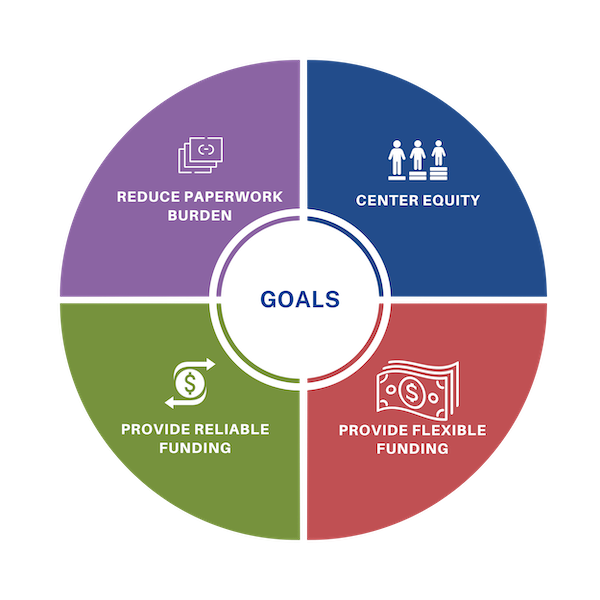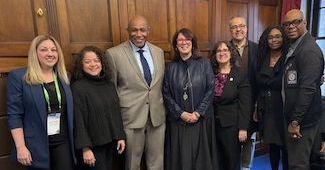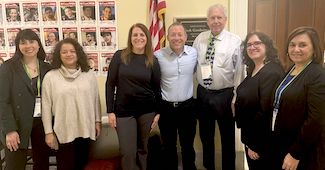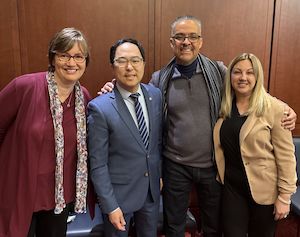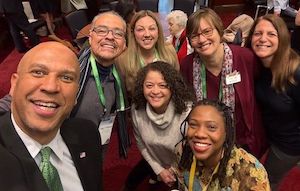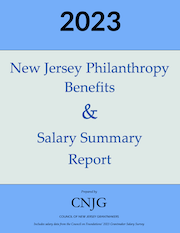Site Search
- resource provided by the Forum Network Knowledgebase.
Search Tip: Search with " " to find exact matches.
CNJG joined delegates from the across the country for Foundations on the Hill on February 25 - 28. The event included a policy conference followed by meetings on Capitol Hill.
Joining me, the CNJG delegation included Bill Engel, President, The Union Foundation; Sharnita Johnson, Vice President of Strategy, Impact and Communications, Victoria Foundation; Melissa Litwin, Early Childhood Program Director, The Henry and Marilyn Taub Foundation; Jessica Nugent, Senior Program Officer, Burke Foundation; Jonathan Pearson, Executive Director, and Renee Woodside, Senior Program Officer, The Horizon Foundation for New Jersey; Danielle Scott, President and CEO, and Bruce Rubin, Trustee, Pincus Family Foundation; Kortney Swanson Davis, President and CEO, Forman S. Acton Educational Foundation; Catherine Wilson, President and CEO, United Way Greater Newark; Alana Vega, Program Officer, and Hellen Zamora-Bustos, Leonard Lieberman Philanthropy Fellow/Program Associate, Fund for New Jersey; Nelida Valentin, Vice President - Grants & Programs, Princeton Area Community Foundation; and Lucy Vandenberg, Executive Director, Schumann Fund for New Jersey.  Bill and Lucy serve as co-chairs of the CNJG Policy Committee. For the last few years, we’ve also been joined by Linda Czipo, President and CEO, New Jersey Center for Nonprofits. Linda’s voice elevates our conversations and helps ground them in the work nonprofits do every day.
Bill and Lucy serve as co-chairs of the CNJG Policy Committee. For the last few years, we’ve also been joined by Linda Czipo, President and CEO, New Jersey Center for Nonprofits. Linda’s voice elevates our conversations and helps ground them in the work nonprofits do every day.
The 21st Annual Foundations on the Hill, hosted and presented by United Philanthropy Forum in partnership with Independent Sector and the Council on Foundations, is the largest annual public policy and advocacy conference dedicated solely to the philanthropic sector. In addition to meeting with legislators and government officials, FOTH attendees attended pre-conference programming, conference keynotes, expert panel sessions, and several receptions. As part of the conference programming, we learned about the All By April campaign, a nonpartisan effort encouraging philanthropy to make grants to nonprofits conducting election work by the end of April. The authors and researchers of the just released 2024 National Study on Donor-Advised Funds provided an overview of their key findings. We were introduced to the history and priorities of the Black Congressional Caucus Foundation, and their focus on developing thoughtful, creative and informed leaders. And we were reminded about the chilling impact recent Supreme Court rulings could have on the rights of donors to give in ways that align with their values.
We were pleased to meet with all 12 of our NJ Congressional and both Senate offices. We met directly with Congressmen Gottheimer and Kean, along with a quick photo meet-up with Senator Booker.
As part of our meetings, we advocated for the Charitable Act, H.R.3435/S.566 which would provide a non-itemizer deduction of up to 1/3 of the standard deduction; the Nonprofit Stakeholders Engaging and Advancing Together (SEAT) Act, H.R.3245, which would pave the way for stronger policymaking input from the charitable sector and improved data collection about nonprofits; and the Streamlining Federal Grants Act, H.R.5934/S2286, which would simplify the application and reporting requirements for federal grants. These bills strengthen the work of the philanthropic and nonprofit sectors.

 In addition to advocating for legislation that supports our work, and educating Congress about the social sector, FOTH not only helps build relationships with our Congressional delegation, but also provides opportunities for CNJG members to get to know one another. Our annual CNJG FOTH dinner is a time to relax and debrief about our meetings. New this year, a few of us took the opportunity to see Washington by moonlight.
In addition to advocating for legislation that supports our work, and educating Congress about the social sector, FOTH not only helps build relationships with our Congressional delegation, but also provides opportunities for CNJG members to get to know one another. Our annual CNJG FOTH dinner is a time to relax and debrief about our meetings. New this year, a few of us took the opportunity to see Washington by moonlight.
This year we were thrilled to welcome several CNJG members new to the FOTH experience!
 We’re also thrilled to welcome a new CNJG team member, Shakirat Odunsi, Manager of Communications! With over 20 years of experience in the marketing and communications field, Shakirat will lead and manage our communications strategy, marketing efforts for CNJG events, services and offerings, and our website and social media channels. Shakirat can be reached at [email protected].
We’re also thrilled to welcome a new CNJG team member, Shakirat Odunsi, Manager of Communications! With over 20 years of experience in the marketing and communications field, Shakirat will lead and manage our communications strategy, marketing efforts for CNJG events, services and offerings, and our website and social media channels. Shakirat can be reached at [email protected].
It was quite an eventful 3+ days. Thank you to the CNJG FOTH delegation for sharing your time and expertise. I’m proud that we were part of over 300 voices attending FOTH from across the country, sharing philanthropy’s positive impact, advocating for the nonprofit sector, and supporting legislation that strengthens our work.
Another important platform to strengthen and inform both the philanthropic and nonprofit sector in NJ is on June 18. The Spring Colloquium - Empowering the Future: Harnessing AI and Data for Philanthropic Social Impact, will explore how AI can enhance problem-solving without losing human connections, how it affects equity, and how philanthropy has engaged with AI for funding initiatives. Save the date – registration will be available soon!
Sincerely,
Theresa Jacks, President and CEO
Council of New Jersey Grantmakers

Deepening Philanthropic and Nonprofit Partnerships in New Jersey
Doing Good Better, a partnership of the Council for New Jersey Grantmakers and the New Jersey Center for Nonprofits, is a community of funders and nonprofits taking action against the power imbalances and racial inequities in philanthropy, nonprofits and government. Accessible, equitable, and mutually accountable relationships are primary and indisputable building blocks for a stronger society and thriving communities. Our goal is to shift the culture of the New Jersey philanthropic and nonprofit ecosystem by encouraging funders, nonprofits, and government to create shared power rooted in collaboration, mutual trust, and respect.
Doing Good Better Goals: A Framework for Change
The Doing Good Better Steering Committee encourages funders to focus on and advocate for four changes that can make an immediate difference in addressing power dynamics between nonprofits and funders and maximizing nonprofit impact.
Why now?
For many years, but particularly in the context of the COVID-19 pandemic, natural disasters, and the heightened outcry for racial equity and social justice, funders have been urged to embrace more flexibility and transparency in their grantmaking. Practices such as general operating support, simplified application and reporting procedures, multi-year funding and others have been shown to level the power imbalance, advance greater equity, strengthen partnerships between funders and their nonprofit partners, and thereby improve community impact.
Many grantmakers temporarily embraced flexible practices in the wake of Superstorm Sandy and during the height of the pandemic, and these structural changes empowered nonprofits to become more resilient and have a greater impact in their communities. But while some funders have retained the flexible practices, others have reinstated previous restrictions.
In New Jersey and across the country, there is a renewed urgency to NOT return to business as usual. It’s long past time.
Doing Good Better invites all of us to reflect on how power is distributed in our partnerships, learn from our peers, and make adjustments that position all community partners for transformative, equitable change in New Jersey.
How?
Guided and informed by 50+ advisors from New Jersey who represent a broad range of perspectives from nonprofits, philanthropy, and beyond, we are approaching this work through the lens of systems change – the recognition that transformative change can only occur after power structures have been addressed collectively. Specifically, Doing Good Better encourages funders to consider the power dynamics that underpin their policies, practices, and resource flows. To do this, we provide resources and a space for dialogue centered on changes in key practices and culture shifts.
Quick practice changes you can make now.
The road to systems change begins with changing practices that impede nonprofits’ pursuit of their missions, and implement practices that demonstrate respect for and trust in the expertise and experience of nonprofits and the communities they serve. Several key practices have consistently been shown to be particularly effective. Many of these have been requested by nonprofits for quite some time, and are reflected in the principles of Trust-Based Philanthropy and Community-Centric Fundraising, among others. Here are a few practice changes you can make now:
Type of Funding
● Give multiyear and unrestricted funding, especially for grantee partners with which you’ve had long term relationships.
Access to Funding
● Create alternative processes for organizations too small to submit audits to reduce barriers to obtaining grants.
● Set aside funding pools for BIPOC-led organizations that may not have access to traditional funding sources.
Simplifying the Process
● Simplify and streamline application and reporting processes.
● Eliminate annual requests for organizational information that does not change from year to year.
Learning
● Engage with the community through participatory grantmaking that aligns with the community’s goals.
● Open dialogues with nonprofits by soliciting and acting on feedback
How do we know?
We’ve asked the experts: nonprofits, foundations, and community members who are working directly in our community as well as peers from across the country who are eliminating power imbalances in their own communities.
● Feedback from over 50+ Advisors
● The Council of New Jersey Grantmakers survey
● The Center for New Jersey Nonprofit’s survey
● The Trust Based Philanthropy Project
● The Community-Centric Fundraising movement
● Thought leaders and advocates throughout the nonprofit community
● Case studies from across the US
Please join the Environmental Funders Affinity Group and the Health Funders Affinity Group for a virtual lunchtime discussion with the NJ Department of Environmental Protection's Chief Strategy Officer, Kati Angarone and Manager NJDEP’s Office of Environmental and Public Health, Christine Schell. This session is designed to explore the connections between the environment and health with emphasis on climate change, environmental justice, and water to educate the philanthropic community on the ways that NJ government is addressing these challenges. The discussion will highlight NJDEP’s efforts to address the impact of these intersecting issues on diverse NJ communities and explore philanthropic opportunities to support local and statewide solutions.
Kati Angarone has worked for NJDEP for over twenty-five years. In her current role, she works to advance strategic initiatives, including expanding public access to environmental information, increasing the visibility of DEP programs and services, cultivating external partnerships, and coordinating strategic planning on cross-media issues. She also oversees the efforts of NJDEP’s Office of Legislative Affairs and our Office of Environmental and Public Health Analysis.
Christine Schell is a 30+ year veteran of the NJDEP and currently manages the NJDEP’s Office of Environmental and Public Health Analysis. In partnership with the New Jersey Department of Health (NJDOH), Christine jointly coordinates New Jersey’s Environmental Public Health Tracking Program through a CDC grant, and oversees the development, implementation, and dissemination of data analyses and visualization tools designed to integrate public health concerns into local and state decision making, planning, and the implementation of meaning actions on a broad array of issues, including environmental justice, climate resilience, and sustainability.
Cost: Free for CNJG Members; $75 for Non Member Grantmakers
Webinar Video
Links and Resources:
Healthy Community Planning NJ
Potential Lead Exposure Mapping
Heat Hub NJ
Environmental Justice Mapping, Assessment, and Protection
New Jersey Department of Environmental Protection
One Health
Climate Change
Climate Change in New Jersey Storymap
Healthy Community Planning
New Jersey Protecting Against Climate Threats
Inland Flood Protection Rule
Resilient Environments and Landscapes
Chill Out NJ
With the overturning of Roe v. Wade, several states have either banned access to abortion care, or severely restricted access. As a result, states like New Jersey have seen a surge in individuals seeking care, further straining reproductive care providers. As New Jersey’s sole member of the National Network of Abortion Funds (NNAF), the New Jersey Access Abortion Fund advances abortion access and bodily autonomy by funding abortions for people traveling to, from, and within New Jersey. The very first portion of this briefing will be an update on the reproductive rights legal landscape from Attorney General Matthew J. Platkin. After the AG departs, we will then introduce attendees to NJAAF’s work and offer a frank conversation about economic barriers that making it difficult for individuals to seek care.
Speakers include:
Matthew J. Platkin, Attorney General, State of New Jersey
Hans Dekker, President, Community Foundation of New Jersey
Sheila Reynertson, Senior Program Officer, Robert Wood Johnson Foundation
Emily Zahn, Board Member, NJ Abortion Access Fund
Kathleen DiGiulio, Board Member, NJ Abortion Access Fund
Cost: Free for CNJG Members only
Quadira Coles (she/her)
Quadira Coles is a legislative/policy professional based in New Jersey/New York, committed to advocating for systemic and material changes that create liberating spaces and experiences for Black people, especially young people. She serves as the President of the New Jersey Abortion Access Fund. Her work focuses on reproductive and sexuality health justice and ending youth criminalization with a framework in Black Feminism. Her start in advocacy started when she began working directly with system-impacted youth through direct service and then worked on political campaigns and training young women to become community organizers. She has her Masters in Public Administration from John Jay College of Criminal Justice and Bachelors in Criminal Justice from Penn State University.
Emily Zahn (she/her)
Emily Zahn is the current Secretary of The New Jersey Abortion Access Fund. She has been a volunteer board member with NJAAF since 2022. With over ten years of experience in nonprofit organizing and fundraising, Emily has had the privilege of working for and volunteering with organizations including the National Institute for Reproductive Health, several Planned Parenthood affiliates, and California Women’s List. She currently works at ActBlue where she heads up their non-profit and PAC account management team. Emily is passionate about building community and connecting supporters to causes they care about in deep, meaningful ways. Emily holds a Master’s in Social Work from NYU and a BSW from Skidmore College.
The rising cost of housing, a limitation on supply of affordable housing stock, and economic shocks and disruptions have led to an increase in homelessness across the United States. Over this time period, the City of Newark has made strides in fostering collaborative and innovative approaches to housing the unhoused. In December, the City released a strategic plan to end chronic homelessness, the first plan of its kind in some time. Specifically, its vision states that “Newark will strive to end chronic homelessness for all individuals over the next three years through collaboration, prevention, and housing.” The vision goes on to state that when it [homelessness] cannot be prevented, it will be a rare, brief, and nonrecurring experience.”
We hope that you will join us as we hear from leaders of this collaborative effort as they discuss how they are working toward their shared vision.
Panelists:
Luis Ulerio, Newark Homelessness Czar, Director of the Mayor’s Office of Homeless Services
Jim Pelliccio, Chair of the City of Newark Commission on the Homeless and President and CEO of Port Newark
Evan Weiss, President and CEO, Newark Alliance
Cost: Free for CNJG Members; $50 for Non Member Grantmakers.
Shifting Narratives to Change Systems
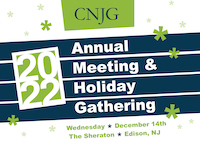 Wednesday, December 14, 11:00 am – 3:00 pm
Wednesday, December 14, 11:00 am – 3:00 pm
Luncheon & Keynote Presentation
Location: The Sheraton, Edison, 125 Raritan Center Parkway, Edison, NJ 08837
Friday, December 16, 11:00 – 12:15 pm
Virtual Workshop via Zoom
The Council of New Jersey Grantmakers thanks everyone who attended our 2022 Annual Meeting & Holiday Luncheon and the Virtual Workshop! We were delighted to see so many familiar faces, and meet many new staff and trustees of our members.
At the business meeting, members elected the new class of trustees, and heard reports about the state of the organization. After lunch and time to reconnect with each other, we heard from our keynote, Bridgit Antoinette Evans, who explained the narrative ocean in which philanthropy swims, and gave examples of how Pop Culture Collaborative is funding organizations to reframe their narratives in which they operate.
During the virtual workshop, members learned about the changemaker experience, how it affects the relationships between funders and their nonprofit partners and even grantseekers. Attendees were led through an exercise to create a journey map, and think through strategies how to examine the experiences that nonprofits have with their organizations.
CNJG members can view recordings and additional resources from the event on the resources tab, when logged in.
Link up with your fellow Emerging Leaders in Philanthropy! We want to get to know you and form connections in-person for the first time since the pandemic. Over savory refreshments, you will have the opportunity for a casual conversation to connect with colleagues, learn more about what’s happening across New Jersey philanthropy, and discuss possible changes within your own work and the sector. You also can share your ideas for future Emerging Leaders Affinity Group meetups. All emerging leaders who are relatively new to the philanthropic field are welcome to break bread together and catch up. Ficus Cafe is BYOB, so feel free to bring your preferred beverage (wine will be available too). Non-alcoholic beverages will be provided. Space limited.
The Emerging Leaders in Philanthropy Affinity Group’s mission is to nurture, develop and support professionals in the philanthropic sector across all departments/roles within foundations. Programming for the Emerging Leaders group is geared towards early and mid-career professionals and will serve as: a professional learning community for emerging professionals working in diverse positions; an opportunity for professional development and individual capacity-building that will lead to institutional change within the member organizations; and as a critical partner in the creation of a pipeline into senior/executive leadership in NJ philanthropy.
Cost: Free for CNJG Members, $50 for Non Member Grantmakers.
Open to Emerging Leaders Funders/Grantmakers
The Disability & Philanthropy Forum invites you to register for the 2024 Disability & Philanthropy Webinar Series. All of our 2024 webinars will be open to the public. This collective learning journey will focus on why a disability lens is essential to addressing key social justice issues. Each webinar will engage philanthropic leaders in conversation with disability advocates about how we can move toward a more equitable, inclusive future for all.
Disability Rights Activism and Organizing: April 11 - 1:00 - 2:00 p.m. ET
Grantmaking for Disability: LGBTQIA+ Funding: May 9 - 1:00 - 2:00 p.m. ET
Disability Pride, Joy, and Visions for the Future: July 11 - 1:00 - 2:00 p.m. ET
Disability and the Care Economy: September 19 - 1:00 - 2:00 p.m. ET
Disability-Inclusive Hiring: October 10 - 1:00 - 2:00 p.m. ET
Disability in Indigenous Communities: November 14 - 1:00 - 2:00 p.m. ET
All webinars are open to the public, so feel free to share with anyone you know that's interested in learning about disability inclusion, rights, and justice.
CART will be provided. If you require another accommodation to fully participate in the webinar, please note it in your registration, or contact us at [email protected].
Join us for an insightful funder briefing on the United for ALICE initiative, a vital program addressing the needs of ALICE families—Asset Limited, Income Constrained, Employed. This briefing will explore the challenges faced by ALICE households, who work hard but struggle to make ends meet due to financial constraints. We will provide a comprehensive overview of ALICE's impact, share success stories, and discuss strategies for enhancing support and expanding opportunities. Attendees will gain a deeper understanding of the economic pressures on ALICE families and learn how targeted funding and collaborative efforts can drive meaningful change. This is an opportunity to engage with key stakeholders, explore innovative solutions, and contribute to a more equitable future for all.
Cost: Free for CNJG Members; $50 for Non Member Grantmakers
Lunch will be served.
RESOURCES
ALICE Video: A Day in the Life: Family Child Care
For more ALICE data:
New Jersey ALICE Dashboard
ALICE Economic Viability Dashboard
ALICE Legislative Tool
Join us for an engaging and informative in-person program that explores innovative strategies and real-world solutions for affordable housing. You will have the opportunity to hear from a robust panel including Taiisa Kelly, CEO, Monarch Housing; Julio Coto, Executive Director, Catholic Charities, Diocese of Metuchen; Michael Callahan, Director, Office of Homelessness Prevention, Department of Community Affairs; Alicia Alvarez, Landlord Liaison, NourishNJ; and Lucy Vandenberg, The Schumann Fund for New Jersey. Q & A follows. Gain valuable insights from a dedicated Advisory Committee member who brings lived experience to the discussion, offering a unique and heartfelt perspective on the challenges and successes in affordable housing. Experience firsthand the impact of Monarch Housing’s initiatives of Kilmer Homes, showcasing the design, functionality, and community benefits of this affordable housing project. Enjoy lunch and a networking opportunity with fellow attendees. This event promises to be a thought-provoking and inspiring experience, highlighting how we can collectively work towards more inclusive and sustainable housing solutions. Register now to be a part of the conversation that shapes the future of affordable housing!
Cost: Free for CNJG Members; $50 for Non Member Grantmakers
Continental breakfast and lunch provided.
National Low Income Housing Coalition: The Gap - A Shortage of Affordable Homes
National Low Income Housing Coalition: Out of Reach - The High Cost of Housing
Department of Community Affairs: Fourth Round Page
Monarch Housing Associates: NJCounts - Point-in-Time
Hosted by United Philanthropy Forum, in partnership with the Council on Foundations and Independent Sector, Foundations on the Hill (FOTH) is an annual opportunity for foundation executives, staff, and board members, philanthropy-serving organizations, and other philanthropic and social sector leaders to meet with their federal lawmakers, talk about issues of interest to philanthropy, and strengthen relationships with their representatives.
The overall purpose of Foundations on the Hill is to:
- Inform and educate Congress about philanthropy
- Advocate on issues affecting foundations
- Build CNJG’s relationships with lawmakers and their staff
- Create visibility for foundations and philanthropy on Capitol Hill
- Encourage Congress to view foundations as resources on key public policy issues
CNJG Makes Strong Showing at Foundations on the Hill 2025
The Council of New Jersey Grantmakers joined over 350 colleagues nationwide at Foundations on the Hill (FOTH) from February 23rd to 26th. This premier policy conference brought together the philanthropic sector for advocacy and education.
The CNJG delegation, led by our President and CEO Theresa Jacks, included Board Chair Craig Drinkard, Executive Officer, Victoria Foundation, Policy Co-chairs, Lucy Vandenberg, Executive Director, The Schumann Fund for New Jersey and William Engel, President, The Union Foundation, as well as a diverse group of foundation leaders representing various regions and interests across New Jersey. Notably, Linda Czipo, President and CEO of the New Jersey Center for Nonprofits, also participated, providing valuable insights from the nonprofit perspective.
FOTH offered a rich program beyond meetings with legislators. Attendees participated in conference sessions, learned about key national trends in philanthropy, and engaged with experts on critical issues like equitable grantmaking, tax reform, and the budget reconciliation process.
The CNJG delegation met with all New Jersey Congressional and Senate offices, including meeting directly with Congressmen Josh Gottheimer and Herb Conaway, and Senator Andy Kim, along with a photo meet-up with Senator Cory Booker. They advocated for the bipartisan Charitable Act, H.R.801/S.317). These bills modify and extend the deduction for charitable contributions for individuals who do not itemize deductions on their tax returns, thereby incentivizing charitable giving and encouraging greater philanthropic support for nonprofits and the communities they serve.
Beyond policy discussions and sharing what is happening on the ground in our state’s communities as a result of executive actions, FOTH provided valuable networking opportunities. The annual CNJG dinner fostered connections and relationships within the delegation, as well as time to debrief about what we were hearing on the Hill. Special thanks to Jermey Grunin, President, Grunin Foundation and Bill Engel for underwriting our dinner!
Overall, CNJG's participation in FOTH proved successful. By advocating for key legislation, educating Congress, and building relationships, CNJG helps ensure the voice of New Jersey philanthropy is heard on Capitol Hill.
2025 CNJG Delegation:
Carrie Bersak, Program Officer, The Burke Foundation
Sharif Braxton, Director, EQUIP NJ
Naeema Campbell, Program Officer, The Fund for New Jersey
Linda Czipo, President and CEO, New Jersey Center for Nonprofits
Kortney Swanson Davis, President and CEO, Forman S. Acton Educational Foundation
Craig Drinkard, Executive Officer, Victoria Foundation
William Engel, President, The Union Foundation
Alma Garcia, Director, Equity Ahora
Jeremy Grunin, President, Grunin Foundation
Theresa Jacks, President and CEO, CNJG
Jessica Johansen, Manager of Portfolio and Strategic Operations, The Tepper Foundation
Sharnita Johnson, Vice President, Victoria Foundation
Jessica Nugent, Senior Program Officer, The Burke Foundation
Katherine Nunnally, CEO, Smith Family Foundation
Jonathan Pearson, Executive Director, The Horizon Foundation for New Jersey
Shelley Skinner, Managing Director of Portfolios, The Tepper Foundation
Nelida Valentin, Vice President, Grants & Programs, Princeton Area Community Foundation
Lucy Vandenberg, Executive Director, The Schumann Fund for New Jersey
Renee Woodside, Associate Director, The Horizon Foundation for New Jersey
Hellen Zamora-Bustos, Grassroots Community Advocate, Equity Ahora
In predominantly renter-based markets across the Northeast, housing-related financial strain remains a significant barrier to household stability and long-term economic security. Yet innovative models are emerging that seek to flip that script, creating pathways for renters to build assets, reduce risk, and participate more fully in local prosperity.
Building on the momentum from AFN’s September 2024 webinar exploring regional strategies to increase affordability, reduce evictions, and deliver financial return or dividends to renters, this session will take a deeper dive into renter wealth-building models in action.
Join AFN, partners in New Jersey, and collaborators from national nonprofits and financial institutions as we explore promising approaches that leverage public-private tools, housing finance innovation, and credit-building strategies tied to rent payment. We’ll examine how these approaches can expand renter access to economic opportunity and help funders consider how to adapt similar efforts in urban centers across the region.
Speakers:
Rachel Levy-Culler, Housing Innovations Senior Specialist, Credit Builders Alliance (CBA)
Marcus Randolph, President & CEO, Invest Newark
Khaatim Sherrer El, Executive Director, Clinton Hill Community Action
Marco Villegas, Program Officer, JPMorgan Chase
Who Should Attend:
Philanthropic leaders, community investors, housing advocates, and public-private partners working to advance financial security and equity for renters. This webinar is open to all and will focus on the New Jersey and Northeast AFN regions.
Captioning will be provided. If you have any other accessibility requests or questions, please email Paula Dworek. Requests for reasonable accommodations must be received by May 5, 2025, to ensure our ability to meet your request.
In this final session of GCIR’s anti-authoritarian series, we will examine how front-line organizations and funders are responding in real time to increasingly oppressive state actions, including the militarization of Los Angeles and recent attempt to take over the nation’s capital, with the promise of more cities to be targeted.
These actions are not only designed to instill fear in communities and discourage dissent, but also represent a dangerous politicization of military force against the administration’s perceived political opponents and communities comprised primarily of residents of color. Considering the magnitude and volume of the threats to immigrants and other communities, funders must consider their responsibility and the role they can play in the response.
As we learned in part II of our series, the actions currently being taken are neither disconnected nor inconsequential but have instead portended democratic backsliding around the globe countless times–serving as a warning sign that our democracy is on the edge. Though these autocratic actions may be federal in their origin, the impacts are felt on the ground in local communities where philanthropy has the power and responsibility to respond.
Speakers
Shruti Garg, Program Officer, The James Irvine Foundation
Jill Garvey, Co-Director, States at the Core
Frances Valdez, Executive Director, Houston in Action
Joanne Lin, Executive Director, Washington Lawyers' Committee for Civil Rights and Urban Affairs
Moderator
Hanh Le, Co-CEO, iF, a Foundation for Radical Possibility
Hear Executive Director Keith Adams speak on how New Jersey VOAD members are responding to the current crisis during our first COVID-19 Funder Briefing.
New Jersey Voluntary Organizations Active in Disaster (VOAD) is a coalition of organizations dedicated to developing and sustaining community resiliency in the face of disasters. In his presentation, Keith will share how NJ VOAD is working with their members, nonprofits, and state partners to coordinate efforts and help to avoid duplicative services. He will also share some of the long-term needs and where there may be gaps in services. NJ VOAD’s dedication to helping communities throughout the entire disaster cycle will provide insight into the continuous and comprehensive efforts that will be essential for improving outcomes for New Jerseyans, especially for our most vulnerable populations.
Following Keith Adam's presentation, CNJG will provide an update on our own work assisting with COVID-19 response and relief efforts.
Cost: Free for CNJG Members and Nonmember Grantmakers.
This program is open to Grantmakers only.
Webinar Video
During 2023, CNJG gathered benefits information from our members to generate our 2023 New Jersey Philanthropy Benefits & Salary Summary Report. Members tell us that this report is one of the most important and effective benchmarking tools for our field. A statistically significant number of members completed our Benefits Report. We are grateful to those that completed the survey, which is a major investment of time, to help us gather this useful data.
The report consists of two sections:
CNJG Benefits Survey
CNJG and our members want specific data about the benefits offered to their employees, board, and more. Therefore, CNJG created our triennial Benefits Survey that gathered this comprehensive data specific to New Jersey’s grantmaking community.
For the second time in this survey’s history, we asked for board and staff demographic data. As more attention is focused on racial equity in our work, it is helpful to benchmark this data in graphical form. We hope it sparks conversation at your organization.
Council on Foundations (CoF) Salary Survey
The salary survey was administered by our partners, the Council on Foundations. This annual nationwide effort by CoF (with the assistance of other Philanthropy-Serving Organizations across the country) benchmarks the salaries of employees at foundations, corporate giving programs, and other philanthropic organizations. CNJG encourages any and all members to complete this survey each year.
Salary information from CoF presents national, mid-Atlantic, and New Jersey data for over 40 staff positions. Salary ranges are only given for positions with five or more reporting organizations. To report on more New Jersey salary data, we hope more members will complete this annual survey.
CNJG reminds our members and other foundations across New Jersey to complete both surveys when they are available – CoF’s is EVERY YEAR, and CNJG’s is every three years. The more data we and CoF can gather, the better and more accurate the results will be for the philanthropic community both in the state and nationally.
Download the 2023 New Jersey Philanthropy Benefits & Salary Survey Summary Report here. You must be a member of CNJG and logged in to access the report.
CNJG's past Summary Reports may be found on our website:
2020 New Jersey Philanthropy Benefits & Salary Survey Summary Report, released in January 2021
2017 New Jersey Foundation Benefits & Salary Summary Report, released in September 2017
2014 New Jersey Foundation Benefits & Salary Summary Report, released in February 2015
2011 Mid-Atlantic Foundation Benefits & Salary Summary Report, released in June 2012
New Jersey grantmakers devote significant resources – both intellectual and financial – to many of the same focus areas as the Department of Community Affairs. Some of CNJG’s members invest almost exclusively in programs related to housing, neighborhood revitalization, and community development.
On June 10, join Commissioner Suárez of the New Jersey Department of Community Affairs for a candid discussion focusing on current priority areas within NJDCA and possible opportunities for New Jersey’s philanthropic community to partner with state government on areas of mutual concern.
This is an excellent opportunity for funders to share knowledge, insights, and best practices that can help to inform the public sector's strategies for addressing key issues facing the state.
Cost: Free for CNJG Members, $95 for Non Member Grantmakers.
A light lunch will be served.
Commissioner Jacquelyn Suárez – Bio
About the Department of Community Affairs (DCA)
DCA 2024 Press Releases
The Disability & Philanthropy Forum invites you to register for the 2024 Disability & Philanthropy Webinar Series. All of our 2024 webinars will be open to the public. This collective learning journey will focus on why a disability lens is essential to addressing key social justice issues. Each webinar will engage philanthropic leaders in conversation with disability advocates about how we can move toward a more equitable, inclusive future for all.
Disability Pride, Joy, and Visions for the Future: July 11 - 1:00 - 2:00 p.m. ET
Disability and the Care Economy: September 19 - 1:00 - 2:00 p.m. ET
Disability-Inclusive Hiring: October 10 - 1:00 - 2:00 p.m. ET
Disability in Indigenous Communities: November 14 - 1:00 - 2:00 p.m. ET
All webinars are open to the public, so feel free to share with anyone you know that's interested in learning about disability inclusion, rights, and justice.
CART will be provided. If you require another accommodation to fully participate in the webinar, please note it in your registration, or contact us at [email protected].
CNJG is pleased to re-convene the South Jersey Funders Consortium for a lunch meeting at the Forman Acton Foundation office in Salem. Join your fellow South Jersey funders for lunch and a round-robin discussion on what your organization is funding and any new initiatives that you are working on -- with a particular focus on any work happening in Salem city.
Any funder located in or funding in the eight southern counties of New Jersey is welcome to attend (Burlington, Camden, Gloucester, Salem, Cumberland, Cape May, Atlantic, and Ocean). Although Camden city is located in south Jersey, and because we already have a Camden funders affinity group, the topics of discussion of the South Jersey Funders Consortium should focus on south Jersey, outside of the city of Camden.
Cost: Free for CNJG Members and Non Member Grantmakers
Lunch provided.
Thank you to the Forman Action Foundation for hosting and underwriting the cost of lunch!
As we settle into the festive spirit of the holiday season, it's the perfect time to take a step back and reflect on the impact we've made - and the exciting possibilities ahead. I'm reaching out once again to remind you about the CNJG Annual Meeting & Holiday Gathering - our key year-end event where we gather to reflect, learn, and most importantly, strengthen the connections that make our work in philanthropy so impactful.
This year's theme, Inspiring Change through Leadership: Maximizing Philanthropic Impact, is about how we can use leadership to drive meaningful and lasting change. I'm excited to share that this year's gathering will offer an inspiring mix of learning, reflection, and connection - an opportunity to think about where we've been and where we want to go next.
Here's what to look forward to:
- Leadership in Action Workshop: We'll be diving into the New Jersey Principles for Philanthropy with a panel of CNJG members who have led the efforts for CNJG to adopt the principles. The panelists will discuss how they are aligning their work with the principles, where some challenges lie ahead, and how we can promote these principles within our organizations to engage in further work. It will be an excellent opportunity to learn, discuss, and brainstorm how you, too, can apply these guiding principles to your own work and further strengthen your organization's impact.
- Keynote Address by Amalia Brindis Delgado: I'm especially excited about our keynote speaker, Amalia Brindis Delgado, Chief Strategy Officer, Panta Rhea Foundation. Amalia will speak on leadership and leadership transitions as well as share insights from her work with Leading Forward and Resilience & Renewal Grantmaking. Her talk will offer valuable lessons on navigating change and building organizational resilience - something that's more important than ever as we look towards the future of philanthropy.
A Special Announcement:
I'm also pleased to share that we have a new face joining the  CNJG team. Please join me in welcoming Fortunata Cuomo as our new Development Associate. Fortunata brings a wealth of experience in nonprofit fundraising, and we're excited for you to meet her at the Annual Meeting. Her role will focus on improving and expanding our sponsorship and Resource Marketplace programs, managing all aspects of our grant funding, and spearheading efforts to build new revenue streams. This position is a critical investment in CNJG to help us expand our business model and create new opportunities to generate revenue.
CNJG team. Please join me in welcoming Fortunata Cuomo as our new Development Associate. Fortunata brings a wealth of experience in nonprofit fundraising, and we're excited for you to meet her at the Annual Meeting. Her role will focus on improving and expanding our sponsorship and Resource Marketplace programs, managing all aspects of our grant funding, and spearheading efforts to build new revenue streams. This position is a critical investment in CNJG to help us expand our business model and create new opportunities to generate revenue.
With just a few days to go, I encourage you to take a moment to register for the Annual Meeting (if you haven't already) and join us for what promises to be an inspiring, energizing day of conversation and connection. We are truly looking forward to seeing you on December 11 at APA Hotel Woodbridge in Iselin.
A big thank you to our sponsors to date - we couldn't do this without you! Special thanks to Signature Sponsor – Prudential; Contributing Sponsors – Campbell’s, Devils Youth Foundation, Robert Wood Johnson Foundation, and Victoria Foundation; Supporting Sponsors – Grunin Foundation, LISC NJ, Pincus Family Foundation, and WSFS Bank; and Colleague Sponsor – Horizon Blue Cross Blue Shield of New Jersey.
Warmly,
Theresa Jacks, President and CEO
Council of New Jersey Grantmakers
Join National Center for Family Philanthropy as we explore fundamental questions in the context of family philanthropy: “Who is considered family?” and “What is the role of family in family philanthropy?”
As family philanthropies evolve, choosing how to define family—whether it includes lineal descendants or extends to spouses, chosen family, or others—is essential. Families must also decide how and when to include community voices. We will examine the role family members play in shaping philanthropic goals, decision-making processes, and the long-term impact of their giving, while navigating personal relationships and maintaining a commitment to learning.
This session will provide valuable insights for families looking to build, refine, or sustain their philanthropy with shared values and vision.
Cost: This event is free for CNJG Members who are family foundations.
Other types of foundations are ineligible to join this webinar.
This program is a CNJG membership benefit for family foundation members, including staff and trustees, in partnership with the National Center for Family Philanthropy.

